- Clone
- 1D3 (See other available formats)
- Regulatory Status
- RUO
- Other Names
- Thymic stromal lymphopoietin protein receptor, cytokine receptor-like 2, CRL2, CRLF2, IL-XR, TSLP-R
- Isotype
- Mouse IgG2a, λ
- Ave. Rating
- Submit a Review
- Product Citations
- publications
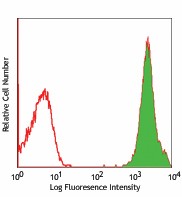
-

Human TSLPR transfected cells stained with 1D3 PE
| Cat # | Size | Price | Quantity Check Availability | Save | ||
|---|---|---|---|---|---|---|
| 322906 | 100 tests | 244€ | ||||
TSLP-R, also known as thymic stromal lymphopoietin protein receptor, cytokine receptor-like 2, CRL2, and IL-XR, is a type I membrane receptor that forms a functional heterodimeric complex with IL-7R to bind TSLP. The TSLP-R contains a WSXWS motif required for proper protein folding and a box1 motif important for association with the JAKs. TSLP-R has a predicted molecular weight approximately 40 kD, and two isoforms have been reported that are produced by alternative splicing. The TSLP-R is expressed preferentially in myeloid cells including dendritic cells and activated monocytes, and is weakly expressed in T cells. Expression has also been reported in heart, skeletal muscle, and kidney tissues. TSLP binding to the heterodimeric functional receptor (TSLP-R and IL-7R) activates JAK2, STAT3 and STAT5 to stimulate cell proliferation. Ligand receptor interactions haves been implicated in the development of the hematopoietic system, dendritic cell maturation, and the maintenance and polarization of human Th2 memory T cells in allergic diseases.
Product DetailsProduct Details
- Verified Reactivity
- Human
- Antibody Type
- Monoclonal
- Host Species
- Mouse
- Immunogen
- Human TSLP-R:Fc protein
- Formulation
- Phosphate-buffered solution, pH 7.2, containing 0.09% sodium azide and BSA (origin USA)
- Preparation
- The antibody was purified by affinity chromatography, and conjugated with PE under optimal conditions.
- Concentration
- Lot-specific (to obtain lot-specific concentration, please enter the lot number in our Concentration and Expiration Lookup or Certificate of Analysis online tools.)
- Storage & Handling
- The antibody solution should be stored undiluted between 2°C and 8°C, and protected from prolonged exposure to light. Do not freeze.
- Application
-
FC - Quality tested
- Recommended Usage
-
Each lot of this antibody is quality control tested by immunofluorescent staining with flow cytometric analysis. For flow cytometric staining, the suggested use of this reagent is 5 µl per million cells in 100 µl staining volume or 5 µl per 100 µl of whole blood.
- Excitation Laser
-
Blue Laser (488 nm)
Green Laser (532 nm)/Yellow-Green Laser (561 nm)
- Application Notes
-
For most successful immunofluorescent staining results, it may be important to maximize signal over background by using a relatively bright fluorochrome-antibody conjugate (Cat. No. 322905/322906) or by using a high sensitivity, three-layer staining technique (e.g., including a biotinylated anti-mouse IgG (Cat. No. 405303) second step, followed by SAv-PE (Cat. No. 405204)).
- Application References
-
- Bouchlaka MN, et al. 2013. J Exp Med. 210:2223. PubMed
- Product Citations
-
- RRID
-
AB_2085328 (BioLegend Cat. No. 322906)
Antigen Details
- Structure
- Type I membrane receptor, forms functional heterodimeric complex with IL-7R to bind TSLP. Contains WSXWS motif required for proper protein folding and a box1 motif that is important for association with the JAKs. Predicted molecular weight approximately 4
- Distribution
-
Expressed preferentially in myeloid cells including dendritic cells and activated monocytes, weakly expressed in T cells. Also expressed in heart, skeletal muscle, and kidney
- Function
- TSLP binding to functional receptor activates JAK2, STAT3 and STAT5 to stimulate cell proliferation. Has been implicated in the development of the hematopoietic system, dendritic cell maturation, and the maintenance and polarization of human Th2 memory T
- Interaction
- Together with IL-7R binds TSLP
- Cell Type
- Dendritic cells, Monocytes, T cells, Tregs
- Biology Area
- Immunology
- Molecular Family
- Cytokine/Chemokine Receptors
- Antigen References
-
1. Reche PA,et al. 2001. J. Immunol. 167:336.
2. Tonozuka Y, et al. 2001. Cytogenet. Cell. Genet. 93:23.
3. Zhang W, et al. 2001. Biochem. Biophys. Res. Commun. 281:878.
4. Wang YH, et al. 2006. Immunity 24:827. - Gene ID
- 64109 View all products for this Gene ID
- UniProt
- View information about TSLPR on UniProt.org
Related Pages & Pathways
Pages
Related FAQs
- What type of PE do you use in your conjugates?
- We use R-PE in our conjugates.
Other Formats
View All TSLPR Reagents Request Custom Conjugation| Description | Clone | Applications |
|---|---|---|
| PE anti-human TSLPR (TSLP-R) | 1D3 | FC |
| TotalSeq™-A0387 anti-human TSLPR (TSLP-R) | 1D3 | PG |
| TotalSeq™-C0387 anti-human TSLPR (TSLP-R) | 1D3 | PG |
| TotalSeq™-B0387 anti-human TSLPR (TSLP-R) | 1D3 | PG |
Customers Also Purchased
Compare Data Across All Formats
This data display is provided for general comparisons between formats.
Your actual data may vary due to variations in samples, target cells, instruments and their settings, staining conditions, and other factors.
If you need assistance with selecting the best format contact our expert technical support team.
-
PE anti-human TSLPR (TSLP-R)
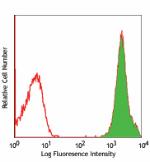
Human TSLPR transfected cells stained with 1D3 PE -
TotalSeq™-A0387 anti-human TSLPR (TSLP-R)
-
TotalSeq™-C0387 anti-human TSLPR (TSLP-R)
-
TotalSeq™-B0387 anti-human TSLPR (TSLP-R)
 Login / Register
Login / Register 









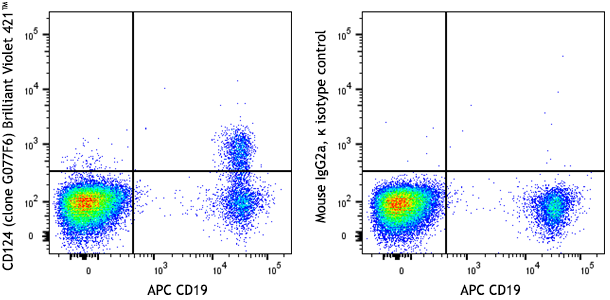

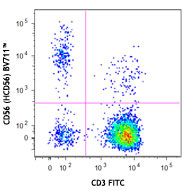
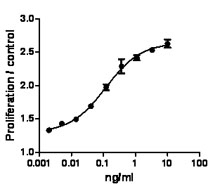



Follow Us